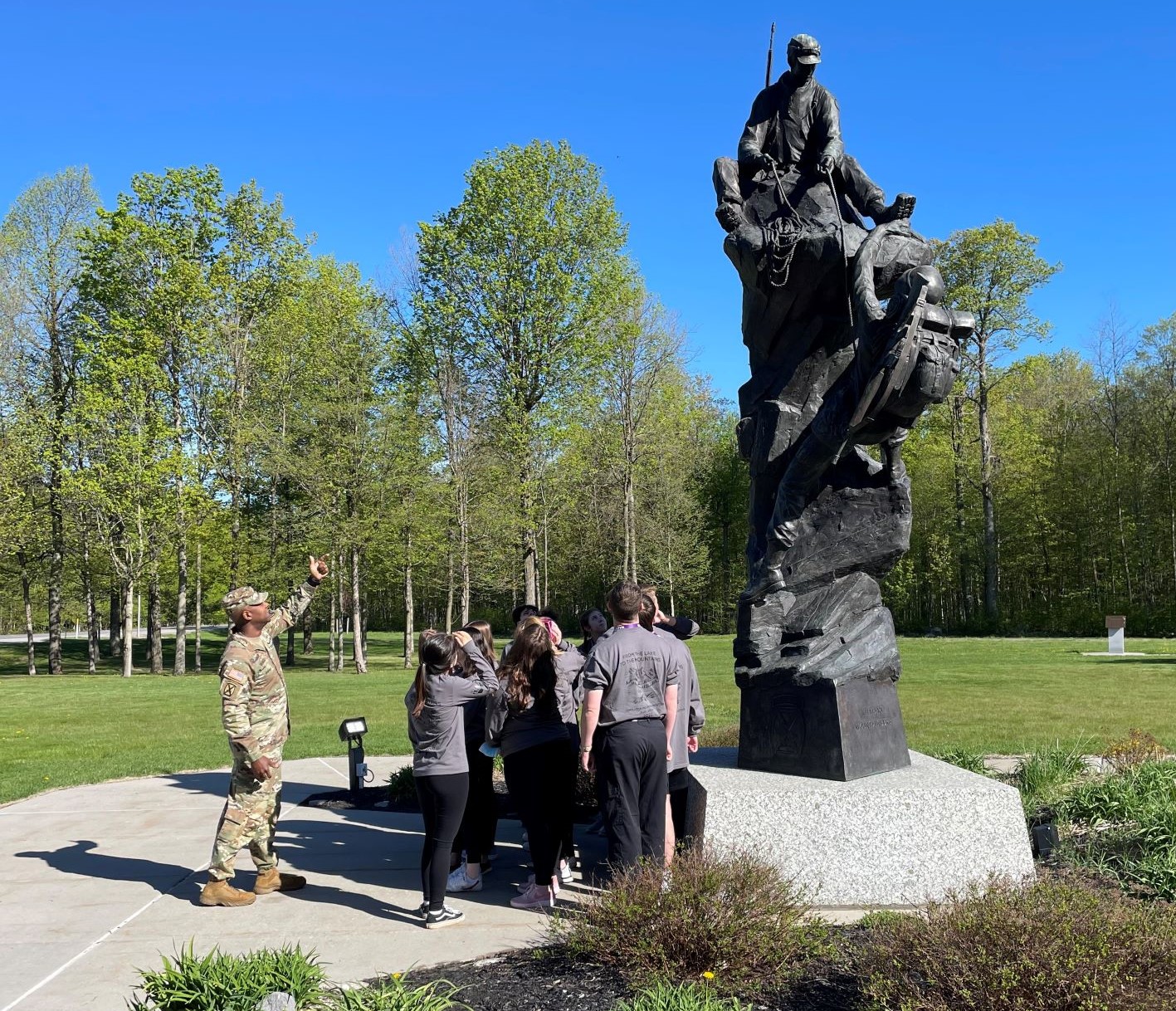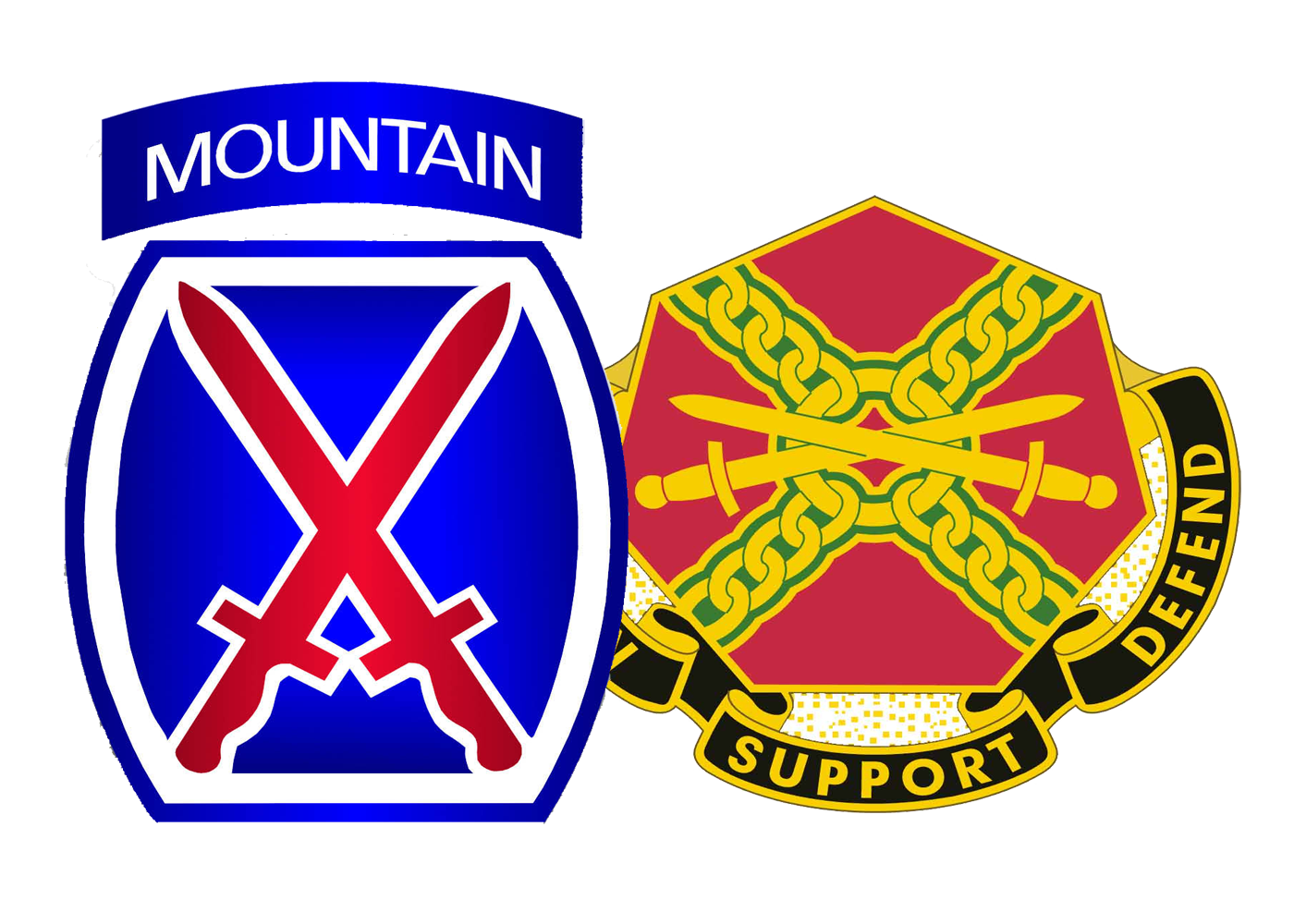
 High school students from Pennsylvania met 10th Mountain Division (LI) senior leaders and Soldiers during two visits to Fort Drum, as part of the Operation Mountain Mentor initiative. Left: Maj. Gen. (P) Milford H. Beagle Jr., 10th Mountain Division (LI) and Fort Drum commander, tells students about the Military Mountaineers Monument and what it means to the local community. (Courtesy Photos)
High school students from Pennsylvania met 10th Mountain Division (LI) senior leaders and Soldiers during two visits to Fort Drum, as part of the Operation Mountain Mentor initiative. Left: Maj. Gen. (P) Milford H. Beagle Jr., 10th Mountain Division (LI) and Fort Drum commander, tells students about the Military Mountaineers Monument and what it means to the local community. (Courtesy Photos)
Operation Mountain Mentor forges bond between Pennsylvania high school students, 10th Mountain Division Soldiers, senior leaders
Mike Strasser
Fort Drum Garrison Public Affairs
FORT DRUM, N.Y. (Sept. 6, 2022) – A tweet from a teacher in Hawley, Pennsylvania, to the commanding general at Fort Drum launched a new leadership development campaign in the 10th Mountain Division (LI) that has impacted hundreds of students, teachers and parents this year.
Sara Rosencrance, a Wallenpaupack Area High School teacher, began following Maj. Gen. (P) Milford H. Beagle on social media in February, after he shared an article and offered leadership insight that related to the education career pathway course she was teaching her students.
“What he posted about leadership just touched my heart,” Rosencrance said. “There’s probably no one more unlike (Maj.) Gen. Beagle in the world than me, at least in the military sense. But in the sense of what he said about making people matter, my hope is that I can be more like him.”
Rosencrance messaged the commanding general online and asked if he would speak to her students, who were researching people in leadership positions.
She received a reply the same day, and coordination began soon after. This back-and-forth correspondence started a relationship that Rosencrance described as being more familial than anything else.
“I really felt like we became part of this family here at Fort Drum that day, and that’s pretty spectacular,” she said.
It also started the student leadership development initiative called Operation Mountain Mentor, which connects 10th Mountain Division (LI) Soldiers with students, faculty, administrators and parents to have conversations about leadership fundamentals and followership principles.
Lt. Col. Kevin “Coach” Smith, 10th Mountain Division G9, said that communicating directly with students allows them to create impressions beyond what people see and hear in films and in the media.
“With Operation Mountain Mentor, we’re talking to them about transformational leadership, diversity and inclusion, and having grit and resilience,” he said. “That’s the curriculum we created for student leader development, but it’s evolved to teacher and administrator development as well. We’re dispelling myths about the Army, and they’re learning about us in ways they never thought about before.”
Beagle spoke virtually with roughly 50 students and teachers in April about leadership and his military experience.
“The sense that you get when you speak to (Maj.) Gen. Beagle, you know that he cares about you as a person,” Rosencrance said. “He made all of those children and adults in our classroom feel valued. Afterward, the students had to write down words that they felt after his presentation.”
She expected to see words like “motivated” and “inspired.” But when students responded with “I matter” and “I am a U.S. citizen,” she knew that putting her students in a room with Army leaders – even virtually – was making a difference.
“That sense of value that they got, I think it is something kids are struggling with today,” Rosencrance said. “They’ve lost connections after two years of COVID, and when you have a two-star general in the Army make you feel like you matter, that is powerful.”
She said that students also connected with Smith, Capt. Sean Robishaw and other members of the Mountain Mentor team.
“When they talked about living your values, I could tell that our students were listening,” Rosencrance said. “How can you not want to be a part of that? I didn’t know where Fort Drum was, but I knew we would really love to visit. So, I got a grant to cover expenses for 16 of our students and our superintendent.”
The group was immersed in Army life at Fort Drum for two days in May – from a morning physical training session and a meal in a dining facility, to learning about the different career fields and jobs that Soldiers have in the 10th Mountain Division.
“Everyone thinks that Soldiers go to basic training, and then you just go to war,” Rosencrance said. “We don’t hear about the 150 MOSs (military occupational specialties), or the team building or educational opportunities. We became aware of so many things we didn’t know, and it wasn’t about trying to recruit students. It was sharing with them about developing leaders of character and about becoming better people.”
Smith said other community engagements that Fort Drum provide – a band performance, a color guard at a sporting event or a helicopter fly-over during a road race – promote a positive image of the Army and the 10th Mountain Division without any overt “Join our team” message.
“People see you out there, and that presents an opportunity to talk about who you are, why you joined the Army and what you do,” he said. “With Operation Mountain Mentor, we are directly engaging students, teachers and parents – and giving them the time to get to know people in the Army and what they do, what they think. Then they can go back to their homes and schools and talk about what they learned here, and they sort of become advocates of Fort Drum and they are amplifying the good things the 10th Mountain Division is doing.”
Rosencrance said that they left Fort Drum feeling as if they were leaving newfound family members, but she knew that they would stay in touch.
“I think what we left with was an understanding that these are normal people who just happen to be Army Soldiers,” she said. “I don’t know if everyone can create that sense of belonging, but we left feeling so connected with (Maj.) Gen. Beagle and his team.”
Rosencrance said she didn’t know it at the time, but students were creating video logs of their experience before and after the trip.
“There was real-time, uncensored feedback of what was happening,” she said. “You just see, every few hours as they’re checking in, that these students – who really had no connection to the military – knew that they were doing something pretty cool. You saw them connect with Lt. Col. Smith and Capt. Robishaw as people, you saw them working with one another in a very organic way, working to be better.”
The students were scheduled to brief the commanding general about what they learned. A 45-minute briefing developed into a two-hour conversation, and what the students had to share would be included in an Operation Mountain Mentor White Paper that would reach four-star-level commands and higher.
“Can you imagine 16 Wallenpaupack Area High School students got the attention of people who can make change in the Army? And they are making change,” Rosencrance said. “The ripple effect of that, I felt, was that we don’t have to join the Army to help the Army. Our job is to be advocates for you, because not enough of us are connected to Soldiers at this level. The Soldiers we met will be our Soldiers forever. And those people, and their stories, will matter to us forever.”
Rosencrance and three of her students were able to visit again with school board members, administrators, teachers and parents during Mountainfest week in August.
“When we came back from our first visit, the students presented to the school board and people felt their excitement,” she said. “People want to be a part of something that makes you feel good. So when (Maj.) Gen. Beagle invited us back, it was crazy how many people wanted to go.”
Rosencrance said it was apparent how much the first experience at Fort Drum resonated in the students on the return trip.
“Our group became so confident after the first visit, and that confidence continues to grow in them,” she said. “And the same thing we got, we were able to give to 21 more people from our school district. I would not have believed something like this would have made a difference like it had, until I saw it for myself. But there’s something special here.”
The Operation Mountain Mentor team also visited Case Middle School in Watertown this summer, with the focus on career exploration for sixth-, seventh- and eighth-grade students. Smith said that he has been impressed with how Operation Mountain Mentor has been received in a matter of months, and how it continues to grow as more units across the Army begin implementing similar initiatives in their communities.
“At the end of the day, we all want the same thing for our children and our students – to teach them values so they will live with honor and integrity, help them make informed decisions about their futures, and to be that positive influence in their lives.”





